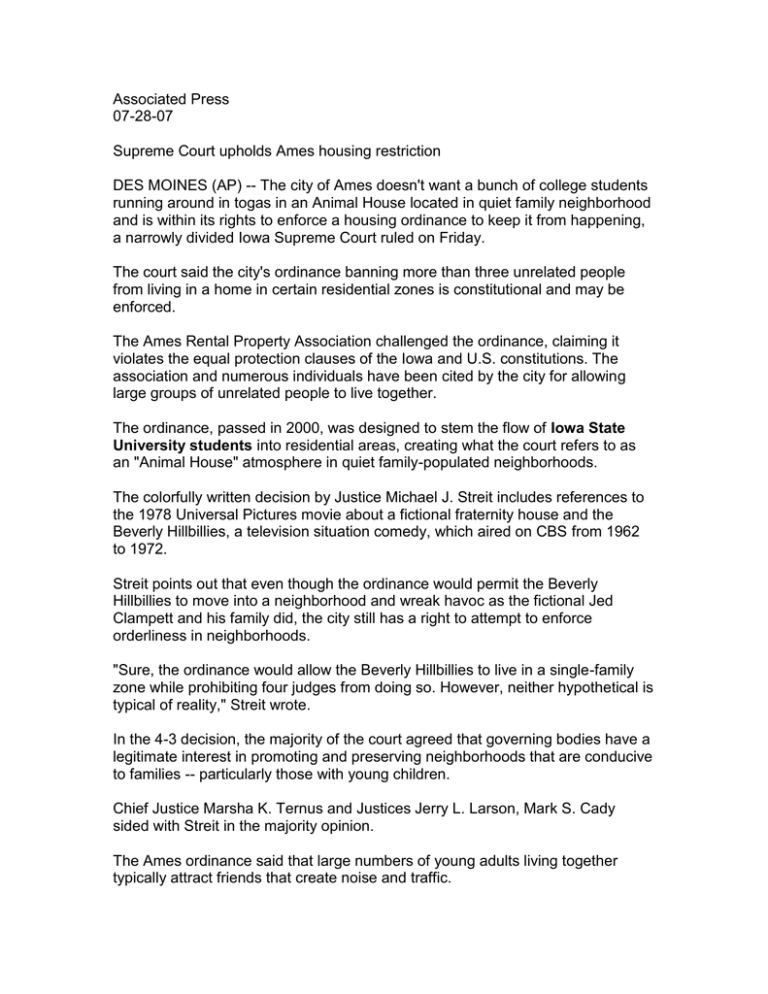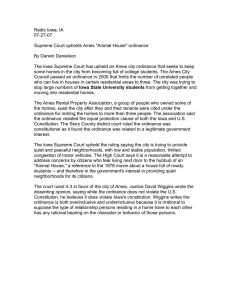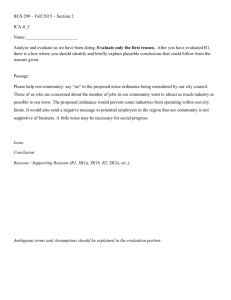Associated Press 07-28-07 Supreme Court upholds Ames housing restriction
advertisement

Associated Press 07-28-07 Supreme Court upholds Ames housing restriction DES MOINES (AP) -- The city of Ames doesn't want a bunch of college students running around in togas in an Animal House located in quiet family neighborhood and is within its rights to enforce a housing ordinance to keep it from happening, a narrowly divided Iowa Supreme Court ruled on Friday. The court said the city's ordinance banning more than three unrelated people from living in a home in certain residential zones is constitutional and may be enforced. The Ames Rental Property Association challenged the ordinance, claiming it violates the equal protection clauses of the Iowa and U.S. constitutions. The association and numerous individuals have been cited by the city for allowing large groups of unrelated people to live together. The ordinance, passed in 2000, was designed to stem the flow of Iowa State University students into residential areas, creating what the court refers to as an "Animal House" atmosphere in quiet family-populated neighborhoods. The colorfully written decision by Justice Michael J. Streit includes references to the 1978 Universal Pictures movie about a fictional fraternity house and the Beverly Hillbillies, a television situation comedy, which aired on CBS from 1962 to 1972. Streit points out that even though the ordinance would permit the Beverly Hillbillies to move into a neighborhood and wreak havoc as the fictional Jed Clampett and his family did, the city still has a right to attempt to enforce orderliness in neighborhoods. "Sure, the ordinance would allow the Beverly Hillbillies to live in a single-family zone while prohibiting four judges from doing so. However, neither hypothetical is typical of reality," Streit wrote. In the 4-3 decision, the majority of the court agreed that governing bodies have a legitimate interest in promoting and preserving neighborhoods that are conducive to families -- particularly those with young children. Chief Justice Marsha K. Ternus and Justices Jerry L. Larson, Mark S. Cady sided with Streit in the majority opinion. The Ames ordinance said that large numbers of young adults living together typically attract friends that create noise and traffic. "By limiting the number of unrelated persons who may live together, Ames's ordinance furthers the city's goal of creating family oriented neighborhoods that are safe and quiet for young children," the court's majority opinion said. "It is also reasonable for the city council to conclude density will be lessened by the ordinance. Therefore, Ames's ordinance does not violate the equal protection clause of the Iowa Constitution." A strongly worded dissent was written by Justice David Wiggins. Justices Daryl Hecht and Brent Appel agreed with him. Wiggins said the Ames ordinance does not violate the U.S. Constitution, but it does violate Iowa's. He said there is no evidence in the case to show that a group of more than three related people will behave better than a group of three who are unrelated. "I cannot accept that distinguishing between related and unrelated persons in a zoning law is rationally related to the promotion of a sense of community, sanctity of the family, quiet and peaceful neighborhoods, low population, limited congestion of motor vehicles, and controlled transiency," he wrote. He said the majority opinion relied on a U.S. Supreme Court case from 1974 to uphold the constitutionality of the ordinance, but that decision was based on social norms of 33 years ago when a typical household "consisted of a mother, a father, and children, with one breadwinner and one vehicle. "In today's society this is no longer the case. Today it is not unusual to see a group of unrelated single persons living together and sharing expenses," Wiggins wrote. Instead of promoting families, he wrote, the ordinance disadvantages those most likely to live with roommates -- the poor and the elderly. "Ames claims it is promoting a sense of community with this ordinance: But whose community is Ames promoting? Is Ames only interested in promoting traditional families or those who can afford to live in a home without roommates -the wealthy and the upper-middle class? It is irrational for a city to attempt to promote a sense of community by intruding into its citizens' homes and differentiating, classifying, and eventually barring its citizens from the community solely based on the type of relationship a person has to the other persons residing in their home."



